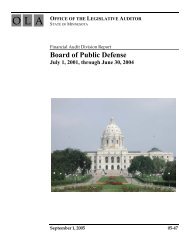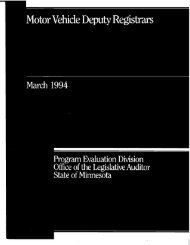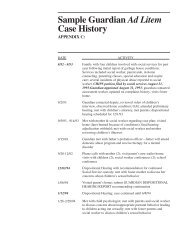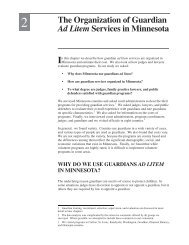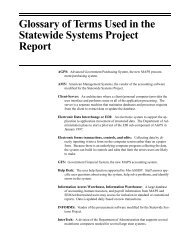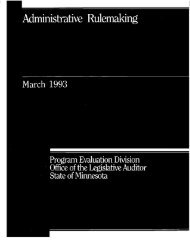Occupational Regulation - Office of the Legislative Auditor
Occupational Regulation - Office of the Legislative Auditor
Occupational Regulation - Office of the Legislative Auditor
Create successful ePaper yourself
Turn your PDF publications into a flip-book with our unique Google optimized e-Paper software.
56 OCCUPATIONAL REGULATION<br />
· Create a new agency or council in <strong>the</strong> executive branch independent <strong>of</strong><br />
<strong>the</strong> state departments and boards with regulatory responsibilities.<br />
Analysis <strong>of</strong><br />
regulatory<br />
policy should<br />
be kept<br />
organizationally<br />
separate<br />
from on-going<br />
regulatory<br />
programs.<br />
Some managers in <strong>the</strong> Health and Commerce departments and elsewhere have<br />
pointed out that <strong>the</strong> functions <strong>of</strong> enforcement <strong>of</strong> existing occupational regulations<br />
and policy analysis <strong>of</strong> new regulatory proposals are incompatible activities. A<br />
department might lack objectivity in studying proposals that would affect an<br />
ongoing program or might be accused <strong>of</strong> self-interest if it seeks to expand<br />
regulatory authority. Despite <strong>the</strong> potential conflict <strong>of</strong> interest, one legislator we<br />
interviewed suggested that evaluations <strong>of</strong> regulatory proposals should be done in<br />
executive branch departments, since, compared to legislative committees, <strong>the</strong><br />
departments are less vulnerable to political manipulation. The departments also<br />
have a level <strong>of</strong> pr<strong>of</strong>essional expertise in various pr<strong>of</strong>essional areas without <strong>the</strong><br />
biases <strong>of</strong>ten associated with regulatory boards or advisory councils dominated by<br />
pr<strong>of</strong>essionals.<br />
The Legislature could take some specific action to encourage or direct <strong>the</strong> boards<br />
or agencies with regulatory responsibility to take a more active role in policy<br />
studies. The departments <strong>of</strong> Health and Commerce (<strong>the</strong> two state departments<br />
with, by far, <strong>the</strong> greatest occupational regulatory responsibility) are both reluctant<br />
to take <strong>the</strong> lead in policy studies, at least judging by <strong>the</strong> interviews we have had,<br />
mainly with middle management. MDH has had an occupational policy analysis<br />
program at various times between 1976 and 1995. The program was interrupted<br />
in part because <strong>of</strong> reduced funding, but <strong>the</strong> activity has started and stopped several<br />
times over <strong>the</strong> years and it is clear that MDH has attached a low priority to this<br />
activity. Our interviews with middle and upper management at <strong>the</strong> Commerce<br />
Department also suggest that <strong>the</strong>y feel policy studies should be done by ano<strong>the</strong>r<br />
agency. Both departments express a degree <strong>of</strong> frustration with <strong>the</strong> fact that <strong>the</strong>ir<br />
previous recommendations have not been heeded.<br />
We believe that nei<strong>the</strong>r Commerce nor Health will be able to contribute much to<br />
solving <strong>the</strong> problem unless a separate organizational unit is created within <strong>the</strong><br />
agencies, free <strong>of</strong> ongoing regulatory responsibilities so that a measure <strong>of</strong><br />
objectivity can be assured and so that occupational policy analysis is <strong>the</strong> central<br />
focus <strong>of</strong> <strong>the</strong> unit’s work. MDH is currently empowered to establish title<br />
protection through <strong>the</strong> rule-making process and this authority could be extended<br />
to <strong>the</strong> Department <strong>of</strong> Commerce as well. 4 Under this arrangement, departmental<br />
studies or recommendations for occupational licensure would be made to <strong>the</strong><br />
appropriate legislative committees.<br />
Over <strong>the</strong> years <strong>the</strong>re have been proposals to create a new executive branch<br />
organization or council to study proposals for occupational regulation and make<br />
recommendations. Last year a bill proposed <strong>the</strong> creation <strong>of</strong> an interagency task<br />
force that would in turn develop a detailed proposal for a permanent council (The<br />
<strong>Occupational</strong> Regulatory Coordinating Council) whose members would be<br />
appointed by <strong>the</strong> commissioners <strong>of</strong> Health and Commerce. 5 One <strong>of</strong> <strong>the</strong> principal<br />
4 Title protection means <strong>the</strong> use <strong>of</strong> a title like “athletic trainer” is reserved to credentialled<br />
workers, but o<strong>the</strong>rs can provide <strong>the</strong> same services as long as <strong>the</strong>y use ano<strong>the</strong>r job title.<br />
5 S. F. 2380.



